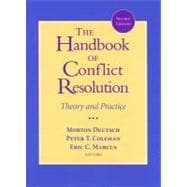
Note: Supplemental materials are not guaranteed with Rental or Used book purchases.
Purchase Benefits
What is included with this book?
Peter T. Coleman holds a Ph.D. and M.Phil. in social/organizational psychology from Teachers College, Columbia University and a B.A. in communications from The University of Iowa. He is currently associate professor of psychology and education at Teachers College, Columbia University and teaches courses in conflict resolution, social psychology, and social science research. Dr. Coleman is director of the International Center for Cooperation and Conflict Resolution (ICCCR) at Teachers College, Columbia University, an innovative Center dedicated to advancing the study and practice of conflict resolution and social justice. He has conducted research on social ingroup-outgroup formation processes (in-group/out-group formation), the mediation of interethnic conflict, intractable conflict, complexity, and the conditions and processes that foster the constructive use of social power. In 2003, he became the first recipient of the Early Career Award from the American Psychological Association, Division 48: Society for the Study of Peace, Conflict, and Violence. Dr. Coleman coedited The Handbook of Conflict Resolution: Theory and Practice (2000; 2006) and has also authored over forty journal articles and chapters.
Eric C. Marcus is a principal of The Marcus Group, a firm specializing in building the capacity of individuals, groups, and organizations through strengthening skills in leadership and group development, feedback, productive conflict, change, and related areas. Based in New York City, he has been a consultant to domestic and international public, private, and not-for-profit organizations since 1984. In addition to his consulting practice, Eric works as a community mediator, is recent past president of the Organization Development Network of Greater New York, and now serves on their advisory board. Eric teaches graduate-level courses in organization development and change, organizational consultation, conflict resolution, and group dynamics at several area universities, including Baruch College, and Teachers College, Columbia University. He received his Ph.D. in Applied Social Psychology from Columbia University.
| Preface | xi | ||||
| Introduction | 1 | (20) | |||
|
|||||
|
21 | (220) | |||
|
23 | (20) | |||
|
|||||
|
43 | (26) | |||
|
|||||
|
69 | (23) | |||
|
|||||
|
|||||
|
|||||
|
92 | (28) | |||
|
|||||
|
120 | (24) | |||
|
|||||
|
144 | (14) | |||
|
|||||
|
|||||
|
158 | (18) | |||
|
|||||
|
176 | (21) | |||
|
|||||
|
197 | (26) | |||
|
|||||
|
|||||
|
223 | (18) | |||
|
|||||
|
|||||
|
241 | (74) | |||
|
243 | (25) | |||
|
|||||
|
|||||
|
|||||
|
268 | (26) | |||
|
|||||
|
294 | (21) | |||
|
|||||
|
|||||
|
|||||
|
315 | (74) | |||
|
317 | (14) | |||
|
|||||
|
|||||
|
331 | (25) | |||
|
|||||
|
|||||
|
|||||
|
356 | (33) | |||
|
|||||
|
389 | (118) | |||
|
391 | (11) | |||
|
|||||
|
402 | (12) | |||
|
|||||
|
|||||
|
414 | (22) | |||
|
|||||
|
436 | (19) | |||
|
|||||
|
455 | (31) | |||
|
|||||
|
|||||
|
|||||
|
|||||
|
486 | (21) | |||
|
|||||
|
|||||
|
|||||
|
507 | (116) | |||
|
509 | (24) | |||
|
|||||
|
533 | (27) | |||
|
|||||
|
560 | (22) | |||
|
|||||
|
|||||
|
582 | (20) | |||
|
|||||
|
602 | (21) | |||
|
|||||
|
|||||
|
623 | (70) | |||
|
625 | (24) | |||
|
|||||
|
649 | (22) | |||
|
|||||
|
671 | (22) | |||
|
|||||
|
|||||
|
|||||
|
693 | (130) | |||
|
695 | (31) | |||
|
|||||
|
|||||
|
|||||
|
726 | (31) | |||
|
|||||
|
757 | (24) | |||
|
|||||
|
781 | (24) | |||
|
|||||
|
805 | (18) | |||
|
|||||
|
823 | (46) | |||
|
825 | (24) | |||
|
|||||
|
|||||
|
849 | (20) | |||
|
|||||
| Concluding Overview | 869 | (12) | |||
|
|||||
|
|||||
| Recommended Reading | 881 | (14) | |||
| About the Editors | 895 | (2) | |||
| About the Contributors | 897 | (16) | |||
| Name Index | 913 | (16) | |||
| Subject Index | 929 |
The New copy of this book will include any supplemental materials advertised. Please check the title of the book to determine if it should include any access cards, study guides, lab manuals, CDs, etc.
The Used, Rental and eBook copies of this book are not guaranteed to include any supplemental materials. Typically, only the book itself is included. This is true even if the title states it includes any access cards, study guides, lab manuals, CDs, etc.